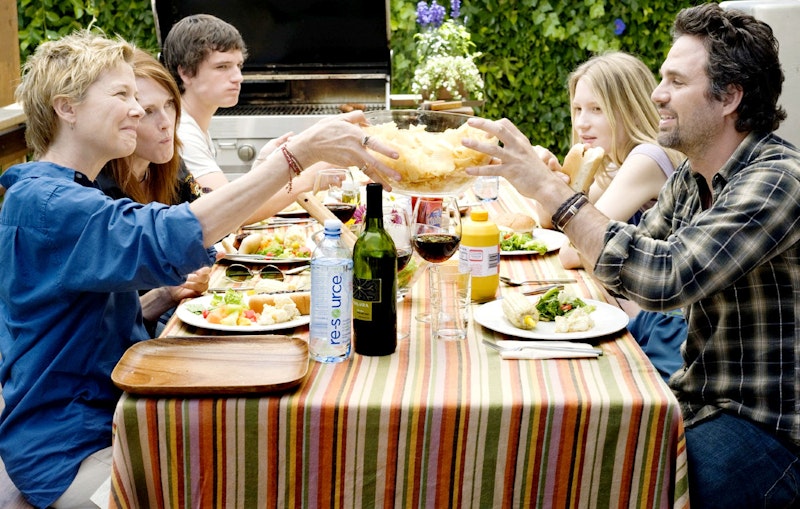Lisa Cholodenko’s 2010 comedy-drama The Kids Are All Right is the first Oscar Best Picture nominee by a woman to center on queer themes. Many other films I’ve looked at in this series on women’s Best Pictures—such as Lost in Translation, An Education, Hurt Locker, and Winter’s Bone, struggle with the problem of creating a women’s cinema in an industry dominated by men. Cholodenko, in focusing on and validating a lesbian relationship, makes an argument that there can be a valid cinema without male gatekeepers or male mentors.
The Kids Are All Right centers on the marriage of Nic (Annette Benning), a doctor, and Jules (Julianne Moore), a homemaker starting a landscaping business. They have two children, 18-year-old Joni (Mia Waskiowska) and 15-year-old Laser (Josh Hutcherson). At Laser’s urging, Joni contacts the donor whose sperm Nic and Jules used.
The guy’s name is Paul (Mark Ruffalo)—he’s a hippie restaurant owner, and his laid-back approach is a strong contrast with Nic’s hectoring parenting style. Joni and Laser quickly bond with him—as does Jules, who feels the overworked Nic is neglecting her. Paul hires Jules to landscape his garden, and the two begin an affair, which precipitates a family crisis.
Roger Ebert in his review of Kids argues that the film isn’t really about lesbian marriage, but instead is “about marriage itself, an institution with challenges that are universal.” There’s some truth to that. Cholodenko does make her couple conventional in many respects; Nic and Jules don’t seem to have any queer friends or community, nor any queer political or cultural commitments. That’s somewhat frustrating for those of us with queer family members.
More positively, the movie’s strength is that it so gracefully and intelligently manipulates marriage melodrama. The solid writing and excellent cast ensures that everyone’s motivations are believable, and it’s hard to hate any of the characters. It’s easy to see why Jules (and Joni) are sick of abrasive, stressed-out, and often downright mean Nic. It’s easy to see why everyone likes charismatically schlubby Paul. It’s easy to see why Paul falls in love with Jules, and with the teens he didn’t know he had. And you can relate to Nic’s devastation when she feels like she’s losing her entire family to, as she says, this “interloper.”
Contra Ebert, I think it’s fairly important for the film that the interloper’s a man, and that the people in the marriage are women. Nic is especially hurt because Jules’ betrayal with a man—and with the couple’s sperm donor—inevitably implies that Nic and Jules’ marriage is an inadequate copy of a real family.
The movie rejects that conclusion; it insists that queer families are real, valid, and important, even when (like straight families) they’re imperfect and messed up. Cholodenko is arguing that lesbian marriages have many of the dynamics of straight marriages—but in making that argument, she’s not saying that lesbian identity doesn’t matter. On the contrary, she’s well aware that showing a sympathetic, messy lesbian marriage in 2010 was—and still in 2024 is—a contested political stance.
The stance is important because queer people continue to face discrimination and hatred. It’s also important because women continue to be seen as, at best, secondary creators of art—and secondary creators of film. Women’s film, if you look at awards and who gets to be directors, is still seen as niche. Male directors, supposedly, make the real movies, just as male fathers supposedly make the real families.
The Kids Are All Right isn’t entirely made by women; Cholodenko co-wrote the screenplay with Stuart Blumberg. Similarly, Jules and Nic did need Paul’s sperm to create their families. The movie isn’t a brief for female separatism. But it does make the case that men don’t have to be in charge for movies, or families, to have value. Given the number of movies directed by women, Hollywood still doesn’t really believe that. The kids may be all right, but the movies still need some work.

